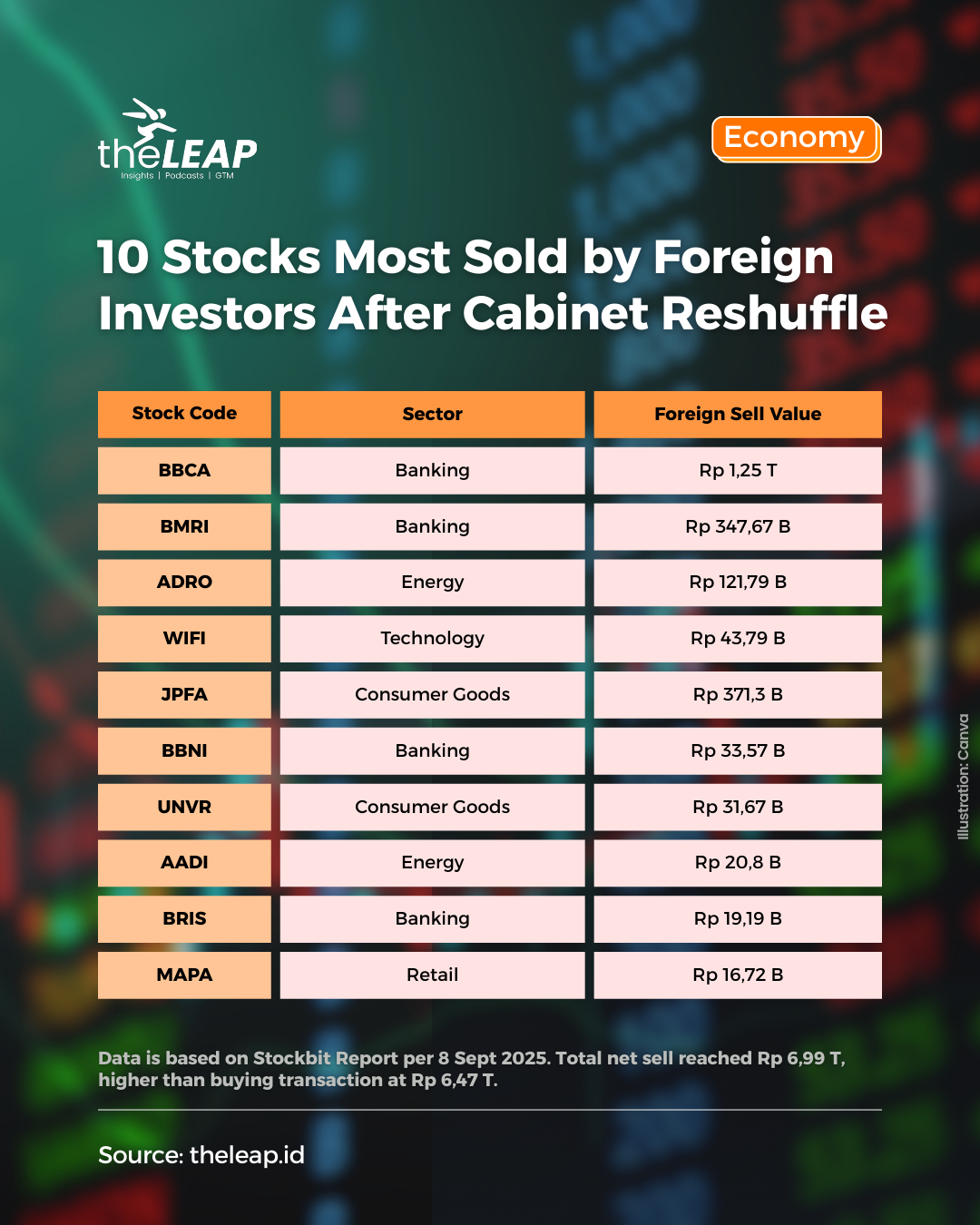Political Transition Triggers Market Uncertainty
Indonesia’s capital market faced renewed turbulence on Monday, September 8, 2025, when President Prabowo Subianto reshuffled his cabinet, including the replacement of the finance minister. The Jakarta Composite Index (IHSG) closed down 1.28 percent at 7,766, after previously climbing as high as 7,912 earlier in the day. Investor sentiment shifted sharply once news of the cabinet reshuffle surfaced, with foreign investors leading the sell-off.
The most significant move came with the replacement of Finance Minister Sri Mulyani Indrawati, a highly respected figure in global financial markets, with Purbaya Yudhi Sadewa, previously the head of the Indonesian Deposit Insurance Corporation (LPS). The decision raised questions about fiscal direction and economic policy, prompting foreign investors to adjust their portfolios.
Foreign investors recorded net sales of Rp 526.17 billion in a single trading day. Overall, they booked total sales of Rp 6.99 trillion, while purchases amounted to Rp 6.47 trillion. This reflected cautious behavior in anticipation of new policy directions and uncertainties around Indonesia’s macroeconomic outlook.
Ten Stocks Most Sold by Foreign Investors
The sell-off was concentrated in several large-cap stocks across banking, energy, consumer goods, and technology sectors. The table below shows the ten stocks most heavily sold by foreign investors during the trading session following the reshuffle:
Banking Sector Under the Spotlight
The banking sector was at the center of investor concern. These institutions are not only among the largest companies by market capitalization but also crucial for credit growth and financial stability in Indonesia. The sharp reaction reflected fears that the new finance minister could alter fiscal and banking-related policies, especially regarding state-owned banks.
Market analysts pointed out that foreign investors often view Indonesia’s large banks as a proxy for the country’s economic health. Any uncertainty about fiscal discipline or changes in regulatory frameworks directly affects the attractiveness of these stocks. While local investors helped absorb some of the selling pressure, the foreign divestments weighed heavily on overall sentiment.
Broader Impact Across Sectors
The sell-off was not confined to banks. Consumer and energy sectors also came under pressure. Japfa Comfeed (JPFA), a leading player in poultry and animal feed, saw foreign outflows of Rp 371.3 billion. Unilever Indonesia (UNVR), a staple of the consumer sector, also recorded net selling of Rp 31.67 billion.
In the energy sector, Adaro Energy Indonesia (ADRO) and its subsidiary Adaro Andalan Indonesia (AADI) were hit as well. Global commodity volatility and domestic policy uncertainties contributed to the declines. The telecommunications and technology space also showed vulnerability, with Solusi Sinergi Digital (WIFI) experiencing sales of Rp 43.79 billion.
The retail sector was not spared either, as MAP Aktif Adiperkasa (MAPA) faced Rp 16.72 billion in foreign sell-offs. The widespread distribution of outflows across sectors indicates broad investor caution rather than a sector-specific weakness.
Historical Context and Investor Sentiment
Cabinet reshuffles in Indonesia have historically had mixed impacts on markets. In some cases, they signal reforms and inspire confidence. In others, they generate uncertainty, especially when key economic portfolios change hands. The finance ministry, in particular, is closely watched by foreign investors.
Sri Mulyani’s reputation for fiscal discipline and credibility with international institutions had anchored investor confidence for years. Her departure, therefore, naturally sparked concerns, even if Purbaya Yudhi Sadewa brings extensive experience in economic policy and financial oversight.
Foreign investors’ decision to sell Indonesian stocks reflects short-term caution rather than a wholesale rejection of Indonesia’s growth story. The country’s economy remains resilient, supported by domestic consumption, investment in infrastructure, and strategic sectors like digital technology and renewable energy.
Outlook for the Indonesian Stock Market
Looking ahead, analysts expect continued volatility as markets digest the implications of the cabinet reshuffle. Investors will monitor early policy signals from the new finance minister, particularly regarding fiscal policy, tax reforms, and state-owned enterprises.
Some experts believe that once clarity emerges, foreign investors may return, especially given Indonesia’s strong growth fundamentals and demographic advantages. In the meantime, domestic investors may find opportunities to accumulate quality stocks at discounted prices.
Overall, while the sell-off underscores the risks tied to political changes, Indonesia’s capital market has historically recovered from such episodes. The ability of the government to provide stability and communicate clear policy directions will be key in restoring investor confidence.
Read More






 Saturday, 31-01-26
Saturday, 31-01-26







